Module5Unit1教案-外研版八年级上册英语
外研版初中英语八年级上册全册教学设计教案

外研版初中英语八上全册教案及导学案初二英语(上)Module 1 Unit 1 教学设计教材分析:Unit 1通过听、读、说训练,初步学习给别人提建议的方法。
其中活动1要求将所给表示学习活动的词汇分类;活动2要求根据录音判断对话主题;活动3—5听读包含建议的对话并完成填表、答问等任务。
活动6学习英语中的连读法;活动7根据提示口头练习给别人提建议的方法。
教学目标:To get to know the key vocabulary.To understand the dialogue 3.To be able to talk about the problems in learning English.教学重点:Key points: translate, correct, grammar, pronunciation, spelling, try to do,Why don’t you…? How about…?教学方法Listening and speaking.教具准备Tape recorder教学流程Grade8 Module1 Unit2达标题:一.Complete the sentences with the next words.Check correct improve match number1.______your English by listening to the radio.2.______the pictures in the order you hear them.3.______the mistakes in these sentences.4._______the pictures with the paragraphs.5._______ your spelling and punctuation.二.完成单词1.You should practice more to i ___________ your English.2.Can you c_________ to 100 in English.3.Don’t f_________ to turn off the English when you leave the room .4.I can’t r__________ all the new words .5.Can you t__________ this word .I don’t understand it.6.R__________ the correct answer.Unit 3 Language in use 教学设计贾建芝教学目标To encourage students to write an English study plan for themselves this year.To say what they’re good at, what they aren’t good at and what they should do.教学重点Focus: Why don’t we …?How about…?You should do ….It is + adj. + to do ….设计思路Present a practical task for the students to learn language in use.Teaching stepsWarming-up教师活动1.Ask the Ss to retell the text in Unit 2. Choose one question to retell2.Ask the Ss “ How to learn English?” and let them to discuss in groups and presenttheir answers.(也可以My ways to learn English为题演讲)学生活动 1.Try to retell the text.2.Discuss in groups and show the answers in front of the class.(2 minutes to prepare ,then give a speech.)In-put教师活动Read and learn the useful sentences in Language in use.You should …Why don’t you….?It’s + adj. + to do sth.学生活动Read loudly and try to understand the meaning of every sentence ,then use them to make some sentences.Practice 1.Listening practice.Play the tape and finish off part 1 and 2.2.Show six pictures. Ask them to talk about them and say if Jack is a goodstudent.(work in pairs.)3.Ask the Ss to give advice to Jack.4.Ask them to work in pairs and read the problem and give advice.(work in groups,each student answer two problems.)5.Ask them to finish part 6-9Practice1. -What are you doing ? -I _____________( play ) football.2. Today is my sister's birthday. She is __________ (cut) her birthday ake now.3. Li Ming _______( have ) five lessons every day.4. He ___________( visit ) his grandfather in Nanning this weekend.5. Leny comes from India. He is ___________(India).6. I will take some _________(photo) in Lingshui Lake.7. On Sunday morning I will help my mother ___________(make) the lunch.8. Jenny will practise ___________(play) the piano this afternoon.9. Would you like __________ (have) a cup of tea?10. I hop you'll enjoy ____________(go) to your grandparents' farm.Out-putAsk students to present their thinking and their English study plan and finish off part 10-12.Make an English study plan for themselves for this year, then read it in front of the class. Summary The difficulties of this unit.Homework 1.Write the new words ten times.2.Write an English study plan.教学反思It’s hard to improve the students’ writing skill. Some students need help.达标题一、单项选择:( ) 1.-Where are you from?-I am from______.A. ChineseB. AmericanC. JapaneseD. America( ) 2.-What's your favourite_____?-It's Maths.A. teacherB. subjectC. foodD. drink( ) 3. I have English, Maths, Chinese and Physics _____ Monday orning.A. onB. inC. atD. to( ) 4.-Can I ask you _____ questions____ a survey ?-Sure.A. any, forB. some, forC.a, toD. an, of( ) 5. He is good at _______ football .A. playB.plaiingC.playingD.plays( ) 6. I like Physics,____Maths is my favourite !A.andB.soC.orD.but( ) 7. Will you do ________ for National Day holidays.A. something specialB. special somethingC. anything specialD. special anything( ) 8. He is looking forward to _______ the famous singer.A. seeB. seesC. seeingD. saw( ) 9.Don't forget _______the flowers when I leave.A.to waterB.waterC.wateringD.waters( ) 10.It will _____ me half an hour to go to school on foot.A.spendB.payC.costD.take( ) 11.I hope you 'll enjoy____here with us.A.liveB.livesC.livingD.to live( ) 12.-_____Tom come to your party this evening ?-I am not sure.A.WasB.AreC.IsD.Will( ) 13.Li Ming often helps me ____ my homework on the weekends.A.withB.onC.inD.about( ) 14.-What will you do in Hong Kong ?-I am not sure. _____ I'll see some famous sights.A.MayB.May beC.MightD.Maybe( ) 15. My brother is too _________ to go to school.A. smallB. youngC. bigD. old二、词形变换,用括号中单词的正确形式填空(20分)1. -What are you doing ? -I _____________( play ) football.2. Today is my sister's birthday. She is __________ (cut) her birthday ake now.3. Li Ming _______( have ) five lessons every day.4. He ___________( visit ) his grandfather in Nanning this weekend.5. Leny comes from India. He is ___________(India).6. I will take some _________(photo) in Lingshui Lake.7. On Sunday morning I will help my mother ___________(make) the lunch.8. Jenny will practise ___________(play) the piano this afternoon.9. Would you like __________ (have) a cup of tea?10. I hop you'll enjoy ____________(go) to your grandparents' farm.Module 2 ExperiencesUnit 1 Have you ever entered a competition?贾建芝题材内容:本模块的语法为现在完成时,内容主要涉及经历。
外研版八上英语教案

外研版八上英语教案【篇一:新外研版八年级英语上册1-12模块教案】 module 1 how to learn englishunit 1 let’s try to speak english as much as possible.第1、2课时【学习目标】1、(知识与技能):掌握下列重点单词的意思及用法:translate, correct, match number, advice,mistake, message, each, spelling,pronunciation, newspaper, excellent.掌握下列短语的意思及用法:give sb. some advice, write it/them down, speak english, in class, do some concerts, try (not) to do sth., each other, help sb. with sth.2、(过程与方法):通过本节的学习,培养学生的探究精神和创新意识,提高学生解决实际问题的能力。
3、(情感、态度与价值观)掌握学习英语的方法,提高学习英语的兴趣,懂得与人交流,注意语言的得体性。
【重点难点】1.重点句式:how about listening to the radio and reading a newspaper in english?try not to translate every word.you should always speak english in class.why don‘t you write down your mistakes?2.难点:提建议的常用表达方法。
【学法指导】课前在熟读单词与短文的基础上认真完成自主学习内容并能把重点单词短语熟记于心,完成探究内容,对未能解答的问题做上标记,课堂上,跟着老师的指导,完成听读训练,学习新的语法知识,并纠正自己在课前完成的任务。
外研版八年级英语上册Module 5 Unit 1(含音频)

Now check(√) the true sentences.
1 Tony went to Lao She Teahouse with Betty and
Lingling.
( F)
2 Betty understood the opera.
( F)
3 Lingling and Betty stayed longer than they planed.
actress difficult end main offer
excellent. They only planned to watch for an hour, but in the (4) __e_n_d___, they stayed for three hours. Betty thought it was interesting — that was the (5) __m_a_i_n__ thing!
Lingling: Yes, it’s quite difficult to understand the story! Just watch the actors and actresses, listen to the music and try to enjoy it.
3 Listen and read.
Betty: No, it was difficult to understand the words. But the actors and actresses were excellent.
Tony: How long did you stay? Betty: We only planned to watch for an hour, but
Betty wanted to see the Beijing Opera, so Lingling (1) _o_f_f_e_re_d__ to take Betty to Lao She Teahouse. The words of the opera were (2) _d_if_f_ic_u_l_t to understand, but the actors and (3)_a_c_tr_e_s_s_es_ were
八年级英语上册 Module 1 How to learn English全模块教案 外研版

Module 1 How to learn English (5 periods)模块教材分析本模块以“How to learn English”为话题,以学习征求建议、提出建议的方法为主线,介绍了单词分类记忆、根据上下文判断词义、听力细节辨认、反向推理、略读等学习方法。
通过模块学习,除了能掌握上述英语学习方法之外,还可根据老师和同学的建议制定更适合自己的学习计划;同时,模块也综合复习了初一所学的一般现在时、现在进行时、一般将来时和一般过去时的用法。
课型设计与课时分配Period 1 Vocabulary and Listening (U1 Ac. 1--4)Period 2 Pronunciation andSpeaking (U1 Ac. 5—6 & WB)Period 3 Reading and Vocabulary (U2 Ac.1--4)Period 4 Writing and Language practice (U2 Ac.5—6 & U3 Ac. 1--6) Period 5 Around the wo rld and Module Task (U3 Ac.7—13 & WB)M1--Period 1: Vocabulary and listening课型:听说课执笔:徐艳姣学习内容 M 1 Unit 1 Try not to translate every word. (Activities 1--4)学习目标 1. 掌握给别人提出建议(关于H ow to learn English)的方法。
2. 能给表示学习活动的词汇分类,掌握单词分类记忆法。
3. 能听懂对话主题,能进行听力细节辨认,完成填表、答问等任务。
4. 复习巩固一般现在时、现在进行时、一般过去时和一般将来时的用法。
学习重点A . Key vocabulary 重点词汇translate, translation, correct, grammar, pronunciation, spelling, term, advice,write down, mistake, else, message, each, each other, excellentB.Key structures 重点句式1. How about …?2. Why don’t you …?3. You should …4. But try(not) to …5.What else?6. It’s a good idea to check your vocabulary notebook everyday.学习难点 1. translate, advice, write down, else的用法。
外研版英语八年级上册Module 5 Unit1 课文重难点

[辨析] offer, give
offer, give 这两个词均可表示“给”。其区别是: give所指的“给”, 对方一般是接受; offer所指的“给”, 对方可能接受, 也可能拒绝。试比较:
He gave me some tickets. 他给了我几张票。
He offered me some tickets, which I refused politely.
2) 动词不定式作形容词的宾语。这类动词 有: able, afraid, angry, careful, easy等。如: I am very happy to meet you.
我见到你很高兴。
She is afraid to waunderstand the cartoon. 看懂这部卡通片很容易。
他要给我几张票, 但我婉言谢绝了。
They __A____ him a job in the company, but he refused(拒绝).
A. offered
B. took
C. showed
D. gave
The hotel ______ excellent service __C___ all the visitors.
B. drinking; something else C. to eat; something else
D. eating; nothing else 【解析】选A。不定式作定语修饰名词或代词
时要放在后面,先排除B、D二项;由关键 信息You can only drink some water. 可排除 C。
1.(无锡中考) He’ll use what he has ______
her a new dress.
Module 5 unit 1 课件--外研版英语八年级上册

['ti:haus] teahouse n.(尤指亚洲的)茶馆
[ɔfə]
offer v. 提议;提出
[end]
end n.(时间的)最后一段,末尾
v. 结束
in the end 最后;终于
no idea 不知道
Unit1 I wanted to see the Beijing Opera.
same time.
Betty: Yes, please. I’ d like to go with you. You can tell me what’ s
happening.
Lingling: Yes, it’ s quite difficult to understand the story! Just watch
Task 1: Listen and check(多选)
A. Beijing Opera D. A famous play
B. Tea
C. Laoshe Teahouse
E. Laoshe
评价任务三:多层次听读,理解大对话(To aim3)
Task 2: Listen and fill in the blanks.
他们提出放学后打扫教室。
评价任务三:多层次听读,理解大对话(To aim3) 评价要求:通过听文本
Task 3: Listen, read and answer.
能正确选出答案。选对 一题得一星。
Tip: Pay attention to the key words.
✮1. Why didn’t Betty understand Beijing Opera?
外研版-英语-八上-M5U1教案

M odule 5 Uni t 1教学设计教材内容课型教学方法教学目标Lis ten ing and speakingFormal and in te r ac t ive p rac t i ce,t ask-based ac t iv i t i es To unders tand the conversa t ion con tain ing in f in i t iveTo ge t spec i f i c in f ormat ion f rom the l i s t en ing mate r ia l教学重难点Did you have a good t ime?In t roduce some verbs tha t mus t be fo l l owed by in f in i t ives.教师活动1. Gree t ing Look a t some p ic tures and通过插图与词汇的引入导出情景导入相关话题,为听力对话做语言上的铺垫,在开课伊始抓住学生的注意力。
训练学生理解大意和细节辨认的能力,培养学生听大意、听细节的技巧。
知识新授2.L i s ten and choose the r igh tanswers(Act iv i ty3)2.L i s ten to the t ape andf ind ou t the r igh t a nswers1.L i s ten and read the训练学生读英语和说英语的conversa t ion.能力,以及对课文的理解能力,培养学生的口头表达能力。
情景操练2.Read the conversa t ion and answer the ques t ions(Act iv i ty4)练教师活动学生活动活动目的Show the impor tant th ings on the Reme mber the impor tan t展示本课重点内容,帮助学生blackboard th ings 加深印象。
外研版八年级英语上册教案 M5 Unit1 教案

Module 5 Lao She Teahouse一、学习目标:A. 单词和短语:actress, teahouse, offer, end, in the end, no idea, act, show, common, describe, society, head teacher, college, novel, if, magicB. 交际用语:1. How was it?2. You know, …3. That’s the main thing.4. No idea.5. — Do you want to see the Beijing opera?—Yes, I’d love to.6. — Do you want to come to Lao She Teahouse with me?—Yes, please. I’d like to go with you.7. I wanted to see the Beijing Opera.8. Lingling offered to take me there.9. We only planned to watch for an hour.10. We decided to stay for three hours.11. I hope to understand more next time.12. — I want to see the Beijing Opera.—Why don’t we …?二、教学目标1. Function: Talking about intentions and plans.2. Structure: Infinitive structures (1): infinitives as objects; verbs followed by infinitives.3. Skills:1) Listening and understanding familiar topics (Beijing Opera) finding specificinformation.2) Describing intentions and plans in simple language.3) Reading and understanding the sequence of events.4) Writing a short passage about favourite play or film.4. Around the world: Theatres5. Task: Acting out a scene from a play.三、重点及难点:Infinitive structures (1): infinitives as objects; verbs followed by infinitives. 四、教学设计:Unit 1 I wanted to see the Beijing Opera.ⅠTeaching modelListening and speakingⅡTeaching methodPWP approachⅢTeaching aims1. Key vocabulary: actress, teahouse, offer, end, in the end, no idea2. Key structures: Infinitive structures (1): infinitives as objects; verbs followedby infinitives.3. Key sentences:1) How was it?2) You know, …3) That’s the main thing.4) No idea.5) — Do you want to see the Beijing opera?—Yes, I’d love to.6) — Do you want to come to Lao She Teahouse with me? —Yes, please. I’d like to go with you.7) I wanted to see the Beijing Opera.8) Lingling offered to take me there.ⅣTeaching aidsTape recorder, OHP, videoⅤTeaching StepsStep 1 Warming-up1. Enjoy a play: Beijing Opera.2. Show some pictures.3. Introduce the new words.4. Learn the new words.5. Read the new words.6. Look at the pictures, and talk something about the pictures.Step 2 Work in pairs.1. Ask the students to read the words in the box in Activity 1.actress dance music play sing teahouse theatre traditional2. Look at the pictures in Activity 1, and talk about them.3. Work in pairs. Use the words from the box to help you.Step 3 Listening practice.1. Ask the students to read through the sentences in Activity2.1) Betty often sees / wants to see some traditional Beijing opera.2) Betty knows / doesn’t know Lao She Teahouse.3) Lingling says that the opera is easy / difficult to understand.2. Play the recording once without stopping.3. Listen and underline the correct words.4. Play the recording again and ask the whole class to check with a partner.5. Check the answers:Keys: 1. wants to see 2. doesn’t know 3. difficultStep 4 Listen and read.1. Show some pictures, and ask the students to talk about them.2. Ask the students to read the conversation silently.3. Play the recording and ask the students to listen and read the conversation.4. Read the conversation.5. Act it out.6. Learn “Everyday English”1) How was it?2) You know, …3) That’s the main thing.4) No idea.Step 5 Check the true sentences.1. Ask the students to read the conversation again.2. Now check the true sentences.1) Tony went to Lao She Teahouse with Betty and Lingling.2) Betty understood the opera.3) Lingling and Betty stayed longer than they planned.4) Betty enjoyed the opera.5) Betty would like to go to the opera again.6) Betty knew about Lao She before she went to the teahouse.3. Ask the students to check with a partner.4. Check the answers:Keys: 1. × 2. × 3. √ 4. √ 5. √ 6. ×Step 6 Complete the passage.1. Ask the students to read the words in the box in Activity 4.actress difficult end main offer2. Read through the passage.Betty wanted to see the Beijing opera, so Lingling (1) ________ to take Betty toLao She Teahouse. The words of the opera were (2) ________ to understand, but the actors and (3)__________ were excellent. They only planned to watch for an hour, but in the (4) ________, they stayed for three hours. Betty thought it was interesting — that was the (5) ________ thing!3. Complete the passage with the correct form of the words from the box.4. Ask the students to check with a partner.5. Check the answers:Keys: 1. offered 2. difficult 3. actresses 4. end 5. mainStep 7 Listen and repeat.1. Play the recording once without stopping.2. Play the recording again and ask the whole class to repeat.1) — Do you want to see the Beijing opera?—Yes, I’d love to.2) — Do you want to come to Lao She Teahouse with me?—Yes, please. I’d like to go with you.3. Ask the students to listen and mark the intonation.4. Now listen again and repeat.Step 8 Work in pairs.1. Ask the students to read the conversations in Activity 5 aloud.2. Make true sentences.1) I want to ___________ next week.2) They offered to ___________.3) I hope to ___________ one day.4) My parents agree to ____________ on Saturday.3. Talk about some thing you’d like to do or see.— I want to go to Xinjiang and ride horses.—…Step 9 Language points1. — Who is Lao She? 老舍是谁?— No idea. 不知道。
八年级英语上册 Module 1 How to learn English教案 外研版 教案
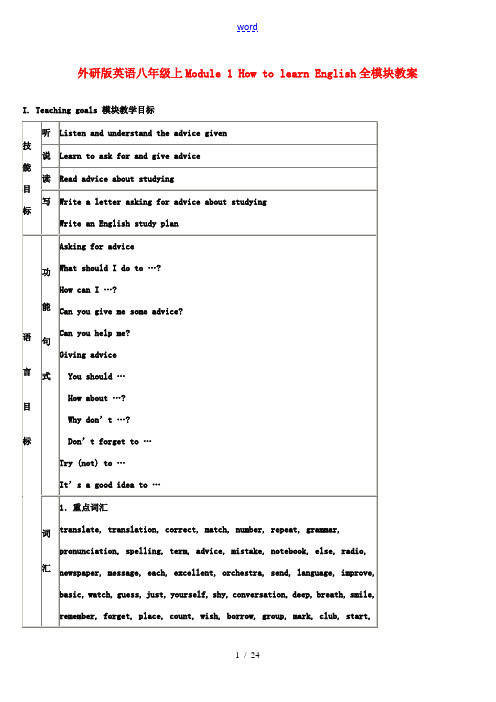
外研版英语八年级上Module 1 How to learn English全模块教案I. Teaching goals 模块教学目标II. Teaching material analyzing 教材分析本模块以“How to learn English”为话题,以学习征求建议、提出建议的方法为主线,介绍了单词分类记忆、根据上下文判断词义;听力细节辨认、反向推理;略读等学习方法。
通过模块学习,学生除了能掌握上述英语学习方法之外,还可以根据同学的建议制定更适合自己的学习计划;同时,模块也复习了一般现在时、现在进行时、一般过去时、一般将来时的用法。
Unit 1 通过听、读、说训练,初步学习给别人提建议的方法。
其中活动1要求将所给表示学习活动的词汇分类;活动2要求根据录音判断对话主题;活动3—5听读包含建议的对话并完成填表、答问等任务。
活动6学习英语中的连读法;活动7根据提示口头练习给别人提建议的方法。
Unit 2 通过读、写训练,学会向别人征求建议或给别人提出建议。
其中活动1要求学生列举自己在语言学习活动中遇到的实际困难。
活动2—4要求学生阅读一语言学习“问答专栏”中内容后完成补全句子、回答问题等练习。
活动5—6要求学生根据自己的学习实际,完成一封求助信并征求同学的建议。
Unit 3 对“提供学习建议”的功能项目进行综合训练,并在此基础上完成制定学习计划的任务。
其中活动1、2 要求听取Charlie和Mary的对话,选出所听到的表示建议的句式并完成问答练习。
活动3—5 要求根据所供图片,描述、评论Jack的学习、生活情况,并根据提示问题提出建议。
活动6要求阅读 Helen的问题并用所供表达完成Simon 的回信。
活动7—9是词汇的拓展训练:其中7要求根据图片写出单词;8用所供词汇组成短语;9用所供词汇完成句子。
Around the world给学生介绍了通过多种渠道学习英语的方法。
Module task要求学生反思自己的英语学习,通过图标明晰信息,并根据图标信息制定学习计划;然后小组交流,提出修改建议。
外研版初中英语八年级上册教案全册
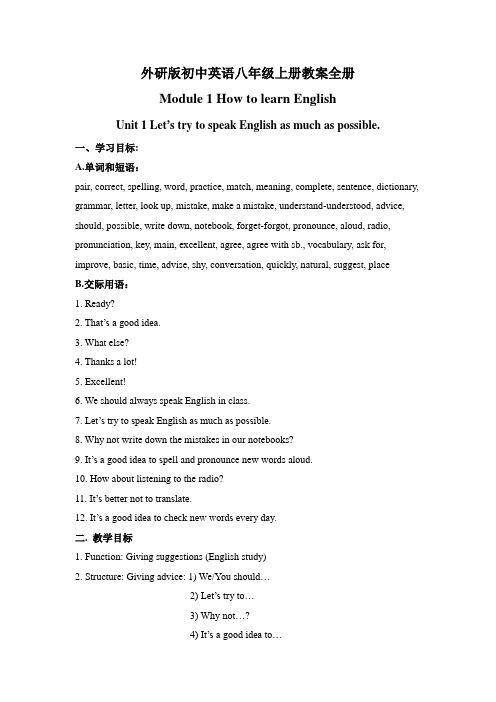
外研版初中英语八年级上册教案全册Module 1 How to learn EnglishUnit 1 Let’s try to speak English as much as possible.一、学习目标:A.单词和短语:pair, correct, spelling, word, practice, match, meaning, complete, sentence, dictionary, grammar, letter, look up, mistake, make a mistake, understand-understood, advice, should, possible, write down, notebook, forget-forgot, pronounce, aloud, radio, pronunciation, key, main, excellent, agree, agree with sb., vocabulary, ask for, improve, basic, time, advise, shy, conversation, quickly, natural, suggest, placeB.交际用语:1. Ready?2. That’s a good idea.3. What else?4. Thanks a lot!5. Excellent!6. We should always speak English in class.7. Let’s try to speak English as much as possible.8. Why not write down the mistakes in our notebooks?9. It’s a good idea to s pell and pronounce new words aloud.10. How about listening to the radio?11. It’s better not to translate.12. It’s a good idea to check new words every day.二. 教学目标1. Function: Giving suggestions (English study)2. Structure: Giving advice: 1) We/You sh ould…2) Let’s try to…3) Why not…?4) It’s a good idea to…5) How about…?6) Why don’t we/you…?7) It’s better not to…3. Skills: 1) Listening and understanding familiar topics (English study).2) Talking about problems in English study and giving advice, conductingconversations in several turns.3) Reading and finding specific information about English study.4) Drafting a letter asking for advice about English study, revising throughpair discussion..4. Around the world: English online5. Task: Writing your English study plan.三、重点及难点:Giving advice: 1) We/You should…2) Let’s try to…3) Why not…? 4) It’s a good idea to…5) How about…? 6) Why don’t we/you…? 7) It’s better not to…四、教学设计:Unit 1 Let’s try to speak English as much as possible.ⅠTeaching modelListening and speakingⅡTeaching methodPWP approachⅢTeaching aims1. To understand conversations involving advice on learning English.2. To get information about how to learn English from the conversation.3. To understand the way of giving advice.4. To practise giving advice on English learning.ⅣTeaching Objectives1. Key vocabulary: pair, correct, spelling, word, practice, match, meaning, complete,sentence, dictionary, grammar, letter, look up, mistake, make amistake, understand-understood, advice, should, possible, writedown, notebook, forget-forgot, pronounce, aloud, radio, key, main,excellent, agree, agree with sb., vocabulary2. Key structures: 1) We/You should…2) Let’s try to…3) Why not…? 4) It’s a good idea to…5) How about…? 6) Why don’t we/you…? 7) It’s better not to…ⅤTeaching aidsTape recorder, OHP , videoⅥTeaching StepsStep 1 Warming up1. Show some pictures of school things. Say how to learn English well.2. Read the words after the teacher.3. Introduce the new words.4. Learn the new words.Step 2 Read and check.1. Read the instructions in Activity 1and check(√) the ones you understand.1) Work in pairs. Ask and answer the questions.2) Correct the spelling.3) Listen and check the words you hear.4) Practise saying the words.5) Match the words with the meaning.6) Complete the sentences with the words in the box.3. Ask the students to check their answer with a partner.4. Call back the answer from the whole class and check the answer.Step 3 Listen and repeat.1. Ask the students to read the word and expressions in Activity2.dictionary grammar letter look up make a mistake meaning understand 2. Read through the questions.1) Which word did Daming not understand?2) What mistake did Lingling make?3) How does Daming usually check the spelling of a word?4) Why is it difficult for Daming to check the spelling of cinema?3. Play the recording and ask the students to listen to the recording carefully.4. Listen and answer the questions. Use the words and expressions from the box.5. Play the recording again, then they can check their answer with a partner.6. Call back the answer from the whole class and check the answer.Step 4 Listen and read.1. Show some pictures, and ask the students to talk about them.2. Ask the students to read the conversation silently.3. Play the recording and ask the students to listen and read the conversation.4. Read the conversation.5. Act it out.6. Learn “Everyday English”Ready?That’s a good idea.What else?Thanks a lot!Excellent!7. Tell the students how to learn English well.1) We should always speak English in class.2) Let’s try to speak English as much as possible.3) Why not write down the mistakes in our notebooks?4) Don’t forget to write down the correct answers next to the mistakes.5) It’s a good idea to spell and pronounce new words aloud every day.6) How about listening to the radio?7) How about reading English stories?8) W hy don’t we try to find some English pen friends?Step 5 Writing.1. Read the conversation again.2. Ask the students to write notes about learning English.Listening : listen to the radioSpeaking : ___________________________________________________ Reading : ____________________________________________________Writing: ____________________________________________________ Learning new words: ___________________________________________3. Ask the students to check with a partner.4. Check the answers:Keys:Listening : listen to the radioSpeaking : speak English as much as possibleReading : read an English storiesWriting: write to pen friends, write down our mistakes in our notebooks, write down the correct answers next to the mistakesLearning new words: spell and pronounce new words aloud every dayStep 6 Underline the correct words and expressions.1. Ask the students to read through the passage in Activity 4.Here’s my (1) advice / notebook about learning English. Speak English (2) always / as much as possible in class, and listen to English (3) in the newspaper / on the radio. I (4) agree / forget it’s a good idea to look up n ew worlds in the ( 5) notebook / dictionary. You can find the (6) correct / excellent pronunciation and learn the meaning2. Underline the correct words and expressions.3. Check with a partner.4. Call back the answers from the whole class.Keys: 1. advice 2. as much as possible 3. on the radio 4. agree 5. dictionary 6. correct 5. Read the passage together.Step 7 Listen and repeat.1. Play the recording once without stopping.2. Play the recording again and ask the whole class to repeat.1) We should always speak English in class.2) Let’s try to speak English as much as possible.3) Why not write down the mistakes in our notebooks?4) It’s a good idea to spell and pronounce new words aloud.5) How about listening to the radio?3. Ask the students to listen and mark the intonation.4. Now listen again and repeat.Step 8 Work in pairs.1. Talk about problems and give advice.Problems AdviceI can’t… How / What about …?I don’t know… Why not / don’t you …?2. Read through the example with the class.—I can’t speak English well. What should I do?—Why don’t you try to talk to our classmates in English?3. Work in pairs.Step 9 Important and difficult points1 Why not write down our mistakes in our notebooks?何不在笔记本上把我们的错误记下来?Why not …? 用来表示提出某种建议,而不是询问为什么不做某事的原因,例如:Why not take a walk in the park ?何不在公园里散散步?我们还可以用下面的表达方式来提建议:Why don’t we drive t o the country?我们何不开车去乡下?What / How about going to Europe for a holiday?去欧洲度假怎么样?Write down 或者put down 表示“记下,写下”。
外研版英语八年级上册Module5《LaoShe’sTeahouse》(Unit1)说课稿

外研版英语八年级上册Module 5《Lao She’s Teahouse》(Unit 1)说课稿一. 教材分析《Lao She’s Teahouse》(Unit 1)是外研版英语八年级上册Module 5的一篇阅读课文。
本节课文主要介绍了老舍的《茶馆》,通过讲述茶馆里的人物和故事,展示了老北京的历史文化。
课文内容丰富,语言生动,充满了烟火气。
本节课主要围绕茶馆里的三位角色——王利发、常四爷和秦仲义展开,通过他们的对话和独白,揭示了各自的性格特点以及他们所代表的社会阶层。
二. 学情分析八年级的学生已经具备了一定的英语基础,能够理解和运用简单的英语进行交流。
但他们在阅读长篇文章时,可能会遇到一些生词和短语的理解困难,因此需要在教学过程中加以引导和帮助。
此外,学生对于老北京的历史文化可能了解不多,需要在课前进行相关背景知识的介绍。
三. 说教学目标1.知识目标:学生能够掌握课文中的生词和短语,理解课文大意,把握人物性格特点。
2.能力目标:学生能够运用所学知识进行口语交流,提高阅读理解能力。
3.情感目标:通过学习课文,学生能够了解老北京的历史文化,增强对祖国文化的自豪感。
四. 说教学重难点1.教学重点:课文生词和短语的学习,阅读理解能力的提高。
2.教学难点:人物性格特点的把握,对老北京历史文化的理解。
五. 说教学方法与手段1.教学方法:采用任务型教学法,让学生在完成任务的过程中,提高英语运用能力。
2.教学手段:利用多媒体课件、图片等辅助教学,激发学生学习兴趣。
六. 说教学过程1.导入:教师通过展示老北京的图片,引导学生谈论自己对北京的了解,为新课的学习营造氛围。
2.读前预测:教师引导学生根据课文标题和图片,预测课文内容。
3.自主学习:学生自主阅读课文,遇到生词和短语时,可以查阅词典或与同桌讨论。
4.合作学习:学生分组讨论,分析课文人物性格特点,总结各自的代表意义。
5.课堂展示:各小组代表向全班同学展示讨论成果,其他同学可进行补充和评价。
外研版八年级英语上册全册教案(教学设计)
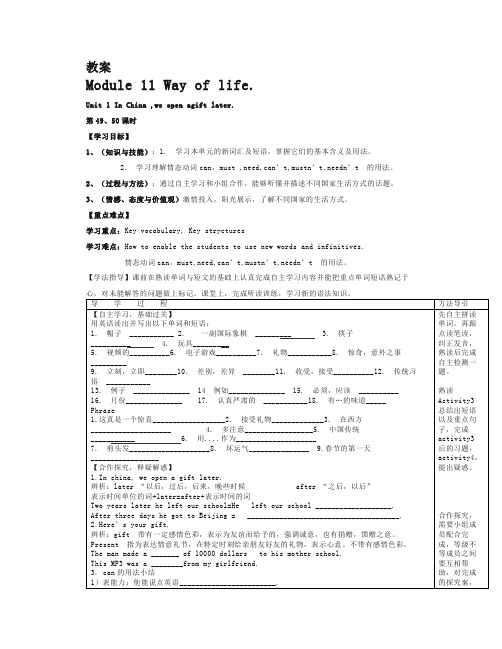
教案Module 11 Way of life.Unit 1 In China ,we open agift later.第49、50课时【学习目标】1、(知识与技能):1. 学习本单元的新词汇及短语,掌握它们的基本含义及用法。
2. 学习理解情态动词can,must ,need,can’t,mustn’t,needn’t的用法。
2、(过程与方法):通过自主学习和小组合作,能够听懂并描述不同国家生活方式的话题。
3、(情感、态度与价值观)激情投入,阳光展示,了解不同国家的生活方式。
【重点难点】学习重点:Key vocabulary, Key stryctures学习难点:How to enable the students to use new words and infinitives.情态动词can,must,need,c an’t,mustn’t,needn’t的用法。
【学法指导】课前在熟读单词与短文的基础上认真完成自主学习内容并能把重点单词短语熟记于Module 11 Way of life.Unit2 In England, you usuallydrink tea with milk.第51、52课时【学习目标】1、(知识与技能):掌握本单元的重点词汇短语、句型。
2、(过程与方法):通过阅读文章及小组合作,学会理解文章大意和提取细节信息的方法。
3、(情感、态度与价值观)能了解一些英国的传统习俗,在短文中获取有效信息。
让学生了解不同的国家有不同的传统习惯,要尊重文化差异。
【重点难点】学习重点:Key vocabulary, Key stryctures学习难点:How to enable the students to use new words and infinitives.情态动词can,must,need,can’t,mustn’t,needn’t的用法。
【学法指导】课前在熟读单词与短文的基础上认真完成自主学习内容并能把重点单词短语熟记于Module 11 Way of life.Unit 3 Language in use.第53课时【学习目标】1、记住M11的单词和短语,并归纳can , can’t , must , mustn’t , needn’t的用法。
外研版初中英语八年级上册《Module 5》模块教学设计(含课时设计)

外研版初中英语八年级上册《Module 5》模块教学设计(含课时设计)【模块学习主题】Module 5Lao She Teahouse模块学习规划课时教学流程设计Step5 A. An hour B. Two hoursC. Three hours4.Who is Lao She?A. A writerB. An actorC. A playerSs: Check the answers in groups.T: Check the answers with the Ss.(2).Ask the students to listen tothe conversation to check the truesentences, then check the answers.(Activity 3)(3)Ss listen to the tape for thethird time, and finish thefollowing sentences.①. Betty wanted to see the BeijingOpera,so Lingling____ to take herthere.②. They planned to watch for anhour,but______ _____ _____,they stayed for three hours.③. Lao She is especially_______for his play Teahouse.Ss:Check the answers in pairs.T: Check the answers with the Ss.(1). T: Organize the students toread the conversation with thevideo.(2).Ask the Ss to practice theconversation with their partners.(3) Have a competition: Ask thestudents to act out theconversation, and see which groupis the best.Post-listening.Task4: Retell the dialogue(1)Ask the students to retellthe dialogue.(2)T: Chinese culture is broad看学生是否能转述对话内容利用短文挖空形式复述对话巩固所学知识点再次训练学生对知识点的掌握。
初中英语外研版八年级上册Module 5Unit 1练习题(附参考答案)

八年级英语上册M5U1练习题班级考号姓名总分一、根据首字母及汉语提示或句意完成句子1.The ________ (女演员) is famous for this wonderful movie.2.My teacher always o________ help to us.3.My grandparents enjoy going to the _________ (茶馆).4.Beijing O________ is famous all over the worlD.5.In the e______, they finished the work on time.二、用所给词的适当形式填空6.It’s important for us _________ (learn) English.7.The dumpling is a kind of __________ (tradition) Chinese fooD.8.He offered _________ (cook) for his parents.9.Mr.Wang hopes _________ (visit) Hainan one day.10.The book is so _________ (interest) that I can’t wait to read it.o She wrote many excellent _______ (play) in his life.12.The boy wants to be an _______ (act) in the future.13.I plan ________ (take) my parents to Shanghai.14.Would you like _________ (go) to school with me?15.The Beijing Opera is difficult _________ (understand).三、单项选择( )16.I’d like ________ a book for my father on Father’s Day.A.buyB.buyingC.to buyD.buys( )17.Mary’s mother plans ________ dinner in this restaurant.A.to haveB.hasC.haveD.having( )18.I like his books, ______ the one was published (出版) last month.A.hardlyB.especiallyC.certainlyD.exactly( )19.My hometown is famous ______ fresh flowers.A.asB.byC.ofD.for( )20.Our government(政府) offered ______ to the people in the earthquake.A.to helpB.helpingC.helpsD.help( )21.I ________ what he saiD.A.look afterB.look upC.agree withD.agree on( )22.The question is _______ for the little girl so she can’t answer it.A.boringB.difficultC.interestingD.exciting( )23.Could you _______ these books to the classroom?A.putB.takeC.bringD.make( )24._______, all the students passed the exam.A.By the endB.At the endC.In the endD.To the end( )25.--________ did the film last?-- About two hours.A.How soonB.How longC.How oftenD.How far四、翻译句子26.老舍尤其以他的戏剧《茶馆》闻名。
外研版八年级英语上册教案 M5 Unit 1 教学设计
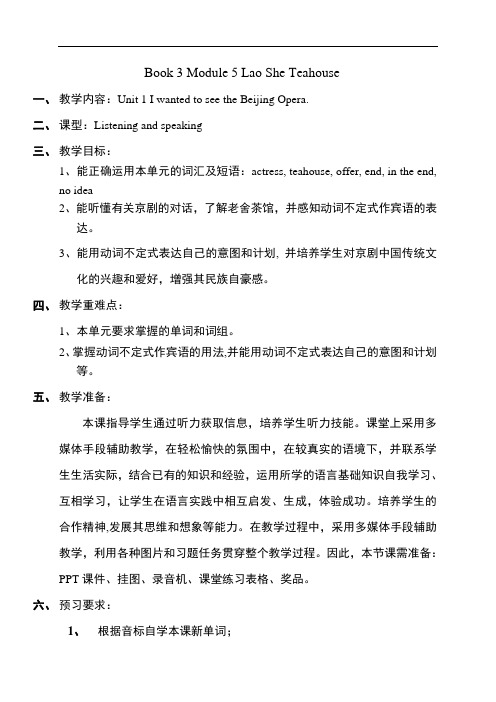
Book 3 Module 5 Lao She Teahouse一、教学内容:Unit 1 I wanted to see the Beijing Opera.二、课型:Listening and speaking三、教学目标:1、能正确运用本单元的词汇及短语:actress, teahouse, offer, end, in the end,no idea2、能听懂有关京剧的对话,了解老舍茶馆,并感知动词不定式作宾语的表达。
3、能用动词不定式表达自己的意图和计划, 并培养学生对京剧中国传统文化的兴趣和爱好,增强其民族自豪感。
四、教学重难点:1、本单元要求掌握的单词和词组。
2、掌握动词不定式作宾语的用法,并能用动词不定式表达自己的意图和计划等。
五、教学准备:本课指导学生通过听力获取信息,培养学生听力技能。
课堂上采用多媒体手段辅助教学,在轻松愉快的氛围中,在较真实的语境下,并联系学生生活实际,结合已有的知识和经验,运用所学的语言基础知识自我学习、互相学习,让学生在语言实践中相互启发、生成,体验成功。
培养学生的合作精神,发展其思维和想象等能力。
在教学过程中,采用多媒体手段辅助教学,利用各种图片和习题任务贯穿整个教学过程。
因此,本节课需准备:PPT课件、挂图、录音机、课堂练习表格、奖品。
六、预习要求:1、根据音标自学本课新单词;2、查找相关资料,找出你认为本课较重要的语言点和短语。
七、教学过程:教学步骤教师活动学生活动设计意图Step One Warmin g-up (3’)Lead in1. Enjoy the music theBeijing Opera.Q1: What’s the song about?Then show the title. (Iwanted to see the BeijingOpera.)2..Free talk: (Activity 1)Ask two students somequestions like this :(1)Do you like the BeijingOpera?(2) Do you want to see theBeijing Opera in Lao SheTeahouse?(3) Do you know Lao She?Who is he?1.Enjoy the song andanswer thequestion.(The BeijingOpera.)2. Listen and answerthe questions.”先用一首京剧来引出本节课的主题,通过这个环节,既活跃了课堂气氛,还调动了学生的学习兴趣同时让学生在free talk的过程中感受新的语言项目,通过这个环节,提高了学生的认知能力。
Module 5 Unit 1教学设计外研版八年级上册英语教学设计
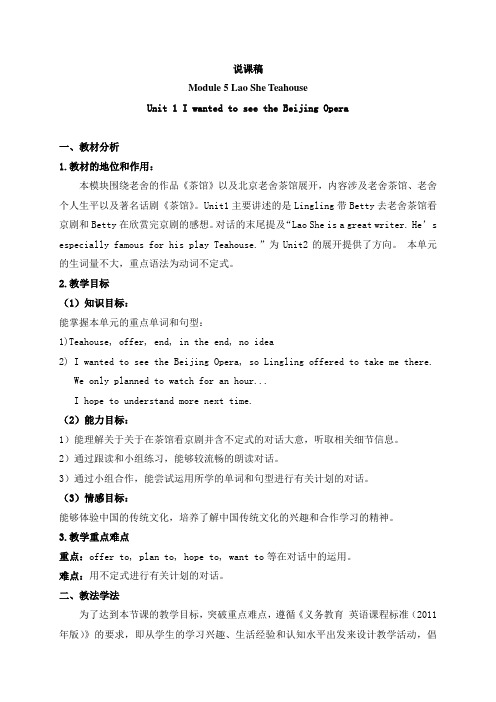
说课稿Module 5 Lao She TeahouseUnit 1 I wanted to see the Beijing Opera一、教材分析1.教材的地位和作用:本模块围绕老舍的作品《茶馆》以及北京老舍茶馆展开,内容涉及老舍茶馆、老舍个人生平以及著名话剧《茶馆》。
Unit1主要讲述的是Lingling带Betty去老舍茶馆看京剧和Betty在欣赏完京剧的感想。
对话的末尾提及“Lao She is a great writer. He’s especially famous for his play Teahouse.”为Unit2的展开提供了方向。
本单元的生词量不大,重点语法为动词不定式。
2.教学目标(1)知识目标:能掌握本单元的重点单词和句型:1)Teahouse, offer, end, in the end, no idea2) I wanted to see the Beijing Opera, so Lingling offered to take me there. We only planned to watch for an hour...I hope to understand more next time.(2)能力目标:1)能理解关于关于在茶馆看京剧并含不定式的对话大意,听取相关细节信息。
2)通过跟读和小组练习,能够较流畅的朗读对话。
3)通过小组合作,能尝试运用所学的单词和句型进行有关计划的对话。
(3)情感目标:能够体验中国的传统文化,培养了解中国传统文化的兴趣和合作学习的精神。
3.教学重点难点重点:offer to, plan to, hope to, want to等在对话中的运用。
难点:用不定式进行有关计划的对话。
二、教法学法为了达到本节课的教学目标,突破重点难点,遵循《义务教育英语课程标准(2011年版)》的要求,即从学生的学习兴趣、生活经验和认知水平出发来设计教学活动,倡导体验、实践、参与、合作与交流的学习方式,本节课主要体现了以下教法学法的理念:情境教学法——通过音乐、图片、视频等方式创设语言情境,丰富学生的直观感受,让学生在情境中学在情境中说。
外研版八年级英语上册Module 5 unit1 I wanted to see the Beijing Opera.教案
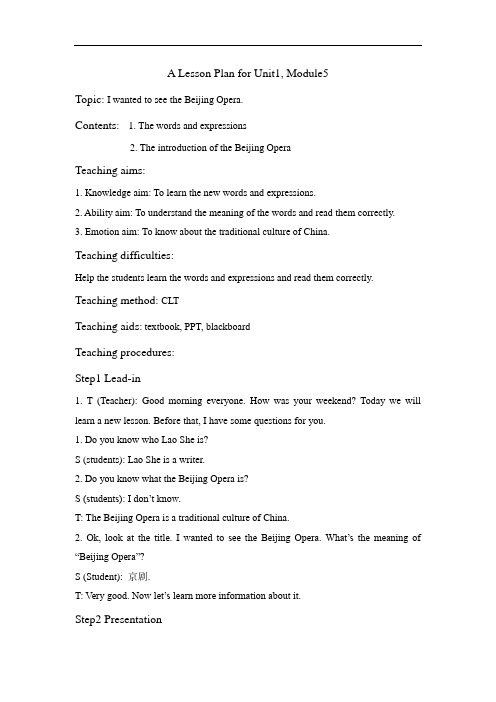
A Lesson Plan for Unit1, Module5Topic: I wanted to see the Beijing Opera.Contents: 1. The words and expressions2. The introduction of the Beijing OperaTeaching aims:1. Knowledge aim: To learn the new words and expressions.2. Ability aim: To understand the meaning of the words and read them correctly.3. Emotion aim: To know about the traditional culture of China.Teaching difficulties:Help the students learn the words and expressions and read them correctly. Teaching method: CLTTeaching aids:textbook, PPT, blackboardTeaching procedures:Step1 Lead-in1. T (Teacher): Good morning everyone. How was your weekend? Today we will learn a new lesson. Before that, I have some questions for you.1. Do you know who Lao She is?S (students): Lao She is a writer.2. Do you know what the Beijing Opera is?S (students): I don’t know.T: The Beijing Opera is a traditional culture of China.2. Ok, look at the title. I wanted to see the Beijing Opera. What’s the meaning of “Beijing Opera”?S (Student): 京剧.T: Very good. Now let’s learn more information about it.Step2 Presentation1. T: Let’s learn the new words first; read after me.(Teach them and explain something about the new words.)2. T: Now please read after me.(Teach each word for twice.)3. Now read after the tape. Pay attention to the native speaker’s pronunciation.Step3 Drilling1. Can you read these words?(Ask some students to read the words. And correct their pronunciation.)2. Follow the tape, and read again.(Ask all the students to read together.)3. Now I will invite some of you to read these words.(Ask individual students to read and correct their pronunciation.)3. T: Now read after the tape and finish the exercise.Step4 ConsolidationT: So much for this class. Can you summarize what we have learned today?(Sum up and ask students to read the new words together.)Step5 HomeworkTime is up. This is your homework. Read the words and expressions and try to remember them.Blackboard designoffer to do sth. eg. She offers to help me.offer sb. sth. = offer sth. to sb.Eg. The teacher offered me a book. = The teacher offered a book to me.I have no idea. = I don’t know.plan to do sth. eg. We plan to watch a movie this weekend.。
WY外研版 初二八年级英语 上册第一学期秋季 部优公开课课堂教学课件 Module 5 Unit 1

Betty: Lingling and I went to Lao She Teahouse last night.
Tony: How was it?
Betty: It was great! You know, I wanted to see the Beijing Opera, so Lingling offered to take me there. We drank tea and watched an opera.
Betty: We only planned to watch for an hour, but in the end, we stayed for three
hours. Tony: Did you enjoy it?
Betty: Well, it was interesting----that’s the main thing. I hope to understandmore
She thought it was difficult to understand the words, but the actors and actresses were excellent.
3. Why did Lingling want to take Betty to the teahouse?
Tony: Who is Lao She? Betty: No idea. Ask lingling. Lingling: Lao She is a great writer. He’s especially famous for his play Teahouse.
1.I want to see the Beijing Opera. 2.Lingling offer to take me there. 3.It was difficult to understand the words. 4.We only plan to watch for n hour. 5.I hope to understand more next time.
八年级英语下册 Module 5 Unit 1 It ’s time to watch a cartoon教案 (新版)外研版

Unit 1 It’s time to watch a cartoon一、教学内容:Unit1It’s time to watch a cartoon.二、课型:Listening and speaking三、教学目标:1、能够正确使用下列单词和词组:cartoon, handsome, smart, fight, cool, hero, humorous,can’t help doing, laugh2、能够综合运用一般过去时、过去进行时和现在完成时。
3、能够识别对话中所提及的卡通故事和人物。
4、能够询问并回答有关卡通故事和相关人物信息。
四、教学重难点:1、能够综合运用一般过去时、过去进行时和现在完成时。
(重点)2、能够询问并回答有关卡通故事和相关人物信息。
(难点)五、教学准备:六、教学过程:1. Talk about the one they lik ertoons?s favourite cartoon is _____What cartoon are they going toing-- Why do you like it?七、板书设计:Module5. CartoonsUnit1. It’s time to watch a cartoon..1) It’s time to do sth= It’s time for sth. \ doing sth.2) I think Superman is better. \ I don’t think we agree.3) I want to be someone like him.4) He keeps fighting bad people. keep doing sth.5)I can’t help laughing when I watch them.( can’t help doing sth. 区分:can’t wait to do sth.)6)learn from sb. \ learn sth. Eg. We should learn from each other and help each other.一.用适当的介词填空:1.What kind _______ fruits do you like best?2.The fairy tales always e nd _______ a happy ending.3. The sunshine goes in _________ the w indow.4. It’s time ________ supper, please help set the table.5. Spiderman can climb up buildings _________ his hands and feet.二、选择正确的答案:( ) 1.—What is your best friend like?— Well, he is__________.A. thin and tallB. tall and handsomeC.tall and beautifulD. nice and friendly( ) 2. I’m afraid to speak in public because I think others may ___________me.A.smile atB.smileC. laughD. laugh at( ) 3. The girl is so happy and she keeps ________ all the time.A. singB. to singC.to singingD. singing( ) 4. It’s 6:30 now. It’s time _______ up.A.toB. forC.to getD.for get( ) 5. They couldn’t he lp _________ after they read the funny story.A. laughingB. to laughC. laughD. to laughing。
最新Module 5 Unit 1 新课讲义 外研版英语八年级上册
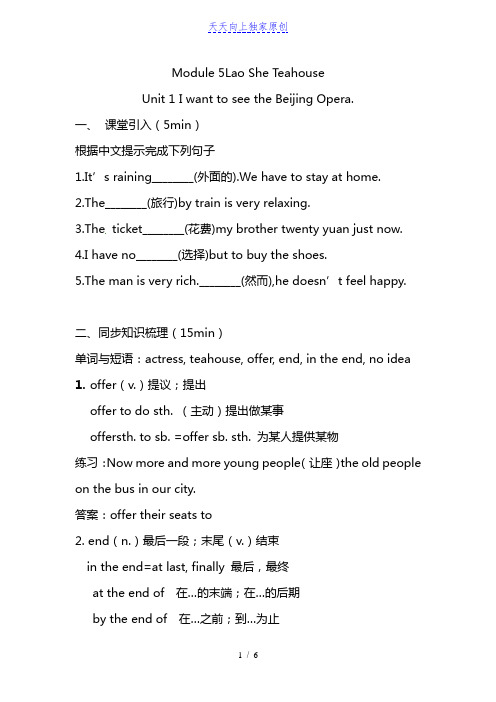
Module 5Lao She TeahouseUnit 1 I want to see the Beijing Opera.一、课堂引入(5min)根据中文提示完成下列句子1.It’s raining________(外面的).We have to stay at home.2.The________(旅行)by train is very relaxing.3.The ticket________(花费)my brother twenty yuan just now.4.I have no________(选择)but to buy the shoes.5.The man is very rich.________(然而),he doesn’t feel happy.二、同步知识梳理(15min)单词与短语:actress, teahouse, offer, end, in the end, no idea 1.offer(v.)提议;提出offer to do sth. (主动)提出做某事offersth. to sb. =offer sb. sth. 为某人提供某物练习:Now more and more young people(让座)the old people on the bus in our city.答案:offer their seats to2. end(n.)最后一段;末尾(v.)结束in the end=at last, finally 最后,最终at the end of 在…的末端;在…的后期by the end of 在…之前;到…为止练习:, he got to the small village.答案:In the end句子:1.–How was it? –It was great!2.You know, I wanted to see the Beijing Opera, so Lingling offered to take me there.3.We drank tea and watched an opera.4.The actors and actresses were excellent.5.I hope to understand more next time.6.No idea. = I don’t know.默读课文,回答问题:1.What did Betty do last night?2.Does Lingling often go to see the Beijing Opera?3.Who is Lao She?Unit 1 I want to see the Beijing Opera.Betty: Lingling and I went to Lao She Teahouse last night. Tony: How was it?Betty: It was great! You know, I wanted to see the Beijing Opera, so Lingling offered to take me there. We drank tea and watched an opera.Tony: Did you understand the opera?Betty: No, it was difficult to understand the words. But the actors and actresses were excellent.Tony: How long did you stay?Betty: We only planned to watch for an hour, but in the end, we stayed for three hours.Tony: Did you enjoy it?Betty: Well, it was interesting—that’s the main thing. I hope to understand more next time.Tony: Do you often go to see the Beijing Opera, Lingling? Lingling: No, I don’t. I wanted to take Betty to the teahouse because it’s famous.Tony: Who is Lao She?Betty: No idea. Ask Lingling.Lingling: Lao She is a great writer. He’s especially famous for his play Teahouse.三、同步题型分析(15min)一、翻译短语,在文中划出1.想要做某事____________________2.主动提出做某事___________________3.给某人提供某物________________4.待三个小时___________________5.最后,最终___________________6.在……的尽头__________________7.对……感兴趣__________________8.希望做某事_____________________9.看京剧______________________10.不知道________________________二、补全句子1.昨晚我们去了老舍茶馆。
- 1、下载文档前请自行甄别文档内容的完整性,平台不提供额外的编辑、内容补充、找答案等附加服务。
- 2、"仅部分预览"的文档,不可在线预览部分如存在完整性等问题,可反馈申请退款(可完整预览的文档不适用该条件!)。
- 3、如文档侵犯您的权益,请联系客服反馈,我们会尽快为您处理(人工客服工作时间:9:00-18:30)。
教学设计
Module 5 Lao She Teahouse
Unit 1 I wanted to see the Beijing Opera
课型:听说课
授课班级:196班
一、教学目标
1. 知识目标:
能掌握本单元的重点单词和句型:
1)Teahouse, offer, end, in the end, no idea
2) I wanted to see the Beijing Opera, so Lingling offered to take me there. We only planned to watch for an hour...
I hope to understand more next time.
2. 能力目标:
1)能理解关于关于在茶馆看京剧并含不定式的对话大意,听取相关细节信息。
2)通过跟读和小组练习,能够较流畅的朗读对话。
3)通过小组合作,能尝试运用所学的单词和句型进行有关计划的对话。
3. 情感目标:
能够体验中国的传统文化,培养了解中国传统文化的兴趣和合作学习的精神。
二、教学重点难点
重点:offer to, plan to, hope to, want to等在对话中的运用。
难点:用不定式进行有关计划的对话。
三、教法学法
为了达到本节课的教学目标,突破重点难点,遵循《义务教育英语课程标准(2011年版)》的要求,即从学生的学习兴趣、生活经验和认知水平出发来设计教学活动,倡导体验、实践、参与、合作与交流的学习方式,本节课主要体现了以下教法学法的理念:情境教学法——通过音乐、图片、视频等方式创设语言情境,丰富学生的直观感受,让学生在情境中学在情境中说。
任务型教学法——通过完成听力任务、完成有关计划的对话、小组展示,让学生在做中学,在任务中慢慢习得有关不定式用法和了解相关的中国传统文化。
自主学习——学生在课前自主学习单词,在课堂上自主完成听力任务、小组朗读课文等。
合作学习——学生需在课前小组合作学习单词、在小组内练习对话,相互学习相互合作,提高学习效率效果。
四、教学媒体:采用PPT、音频、视频等,运用图片、影象创设情境,完成教学活动。
五、教学过程
Step 1 Warming-up
1.播放京剧视频《霸王别姬》让学生对京剧的形式有感知。
2. 向学生提问“Where can we see the Beijing Opera?”引出Lao She Teahouse
3. 简单介绍背景知识:老舍和老舍茶馆。
引出模块5的标题。
4. 通过图片展示,让学生回答“What can we do in Laoshe Teahouse?”,学习生词和口语表达。
5. 提问“What do you want to do in Laoseh Teahouse?”,让个别学生口头回答“I want to ...”Step 2 Pre-listening
1.通过图片学习新单词。
2.Activity 1. 读方框里的单词,并引导学生用方框里的单词看图完成句子。
Step 3 While-listening
1.让学生猜测对话内容。
2. 指导学生听前浏览一遍问题和答案,提醒学生在作业本上记录答案。
3. 播放活动3的听力录音
4. 个别提问学生回答并对照答案。
5. Task 2(P35)齐读句子:
1.Tony went to Lao She Teahouse with Betty and Lingling.
2. Betty understood the opera.
3. Lingling and Betty stayed longer than they planned.
4.Betty enjoyed the opera.
5. Betty would like to see the Beijing Opera again.
6. Betty knew about Lao She before she went to the house.
6. 教师播放录音,学生在听的过程中记录答案。
7. 个别提问,如句子错误的需要学生说出正确的内容。
